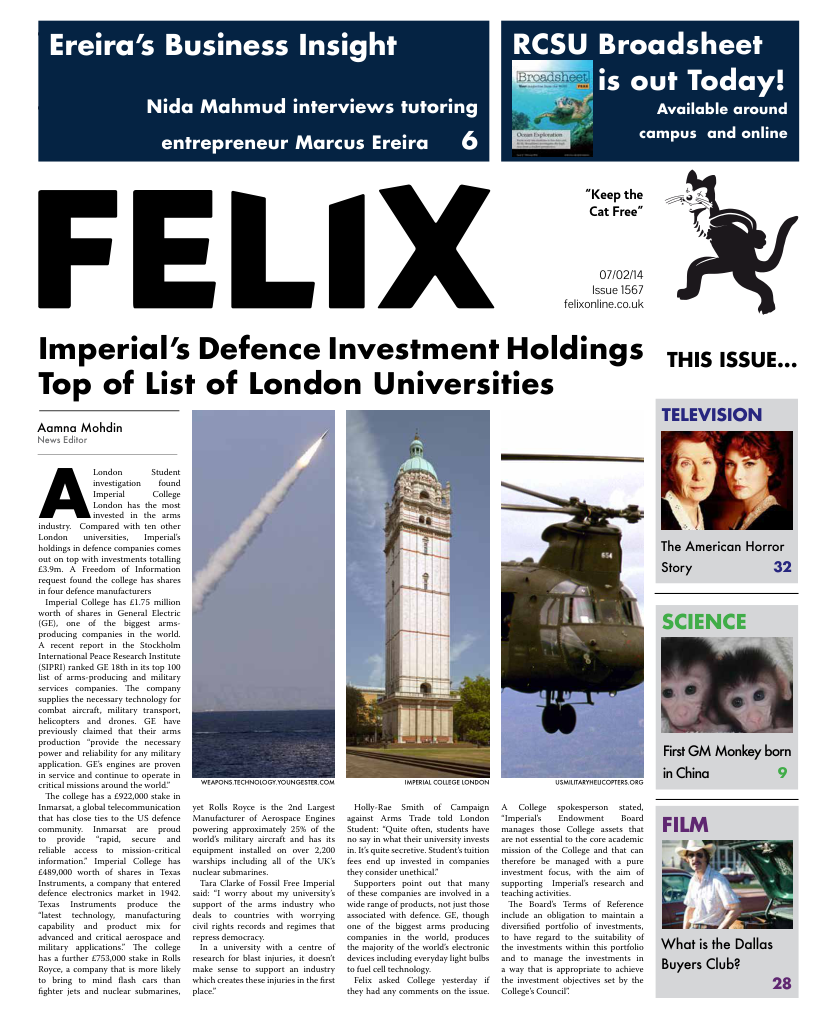Our stake in the arms industry
Imperial College London has a £3.9 million stake in the arms industry, according to a report in the London Student.
Imperial College London has a £3.9 million stake in the arms industry, according to a report in the London Student. The report, published on Monday 27th January, details the shares that London universities have invested in various arms companies. Imperial has by far the largest stake with £3.9 million out of a total of £7.4 million. More specifically: Imperial has £1.75 million invested in General Electric, £922 thousand in Inmarsat, £489 thousand in Texas Instruments and £753 thousand in Rolls Royce. The report says Imperial College refused to comment on its holdings. To my knowledge, it has yet to change this decision. To give a brief and perhaps selective account of the companies: Inmarsat ‘provides mobile satellite communications services’. Two of its four dedicated ‘market-facing business units’ are focussed on ‘government opportunities, both military and civil’. One of them boasts that Inmarsat is ‘the frontline of mission-critical communications for US government.’ The board of directors contains one Admiral James Ellis who apparently served in Vietnam, the Gulf War and is now serving as a Director of arms industry giant Lockheed Martin. Some Imperial students may recognise CEO Rupert Pearce; he has lectured as a visiting fellow on Imperial College Business School’s Entrepreneurship program. General Electric, meanwhile, has played a key role in the development of Obama’s Drone war. As they say in an advertising brochure: ‘the concept of unmanned aerial systems … is revolutionising the way military information is gathered and even how adversaries are engaged. GE Intelligent Platforms has been there every step of the way.’ I assume this means that they accept legal responsibility for any drone attacks that do occur? Still, legal culpability seems unlikely since British judges threw out Noor Khan’s appeal for justice against the GCHQ, which according to legal charity Reprieve passed on locational information to the CIA – resulting in the death of Khan’s father. Apparently, this case was not ‘exceptional’ enough for to ‘sit in judgement’ of a foreign power. This may well be true: at least 4700 people have been executed without trial (‘murdered’?) by drone attacks. What’s one more in 4700? General Electric have a slew of other dubious claims to fame, be it corruption during the sale of fighter jets to Israel or one of the worst environmental and nuclear safety records in the world. As for Texas Instruments, allow me to just quote its ‘High Reliability’ (HiRel) sub-group: ‘it is HiRel's vision to be the world's number one supplier of semiconductor-based products and services to the defense and aerospace markets’. Finally, Rolls-Royce is one of those quintessentially British institutions, and its fortunes were made by some quintessentially British characters. Following the colossal military failure in Kut al-Amara, the massive operation required to take Mesopotamia (Iraq), and the incredible unpopularity of the new liberators (sound familiar?) which culminated in armed revolt in 1920, Secretary of State for War and Air Winston Churchill was working out the best way to reduce military costs in Baghdad. Much of the cabinet was surprised when PM Lloyd George had cavalierly told Secretary of State for War Winston Churchill that he was to ‘take air with him’ also. As an RAF book puts it ‘Lloyd George knew that Churchill was more air-minded than most of his political colleagues’. Thus Churchill was acting in character when he asked father of the RAF, Hugh Trenchard, if he would be willing to take on Iraq. This proved to be a judicious decision; the subsequent military and economic success of the RAF in Iraq had proven the tactical advantages that airpower could afford. Aircraft also had their uses in purely administrative matters. It seems that when Churchill learnt that aerial action had been taken to aid in tax collection – that is, villages bombed for not paying taxes – even the British bulldog balked. However he soon got over his finer scruples: when asked by Trenchard if he wanted to ‘stifle the growing infant’ Churchill replied he was behind airpower ‘in every way.’ This should come as no surprise; this is the man who couldn’t understand ‘this squeamishness about the use of gas’ against ‘uncivilised tribes’ and ‘recalcitrant Arabs.’ Of the planes deployed in Iraq at the time the Bristol Fighter was designed around a Rolls-Royce engine. However the true impact on Rolls-Royce was due to the RAF’s expansion following operations in Iraq, such that by the late-20s aeroplane engines were the mainstay of Rolls-Royce Ltd. By the time Henry Royce died in 1933, he had designed the Merlin aero-engine which was to be used in the most famous British aircraft of WWII, the Spitfire. Thus, in 1934 it is touching to see Lloyd George keen to keep this legacy alive.



